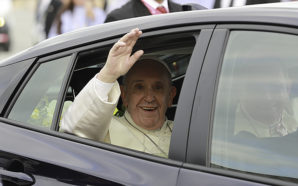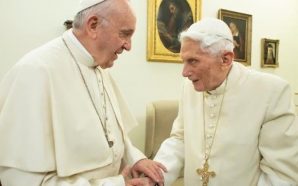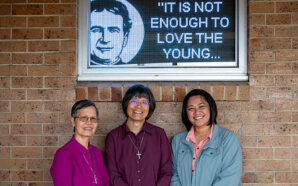Jesus is not just a sign, but the reality of God’s kingdom
If disasters or the pandemic are not the final signs of the end of time and if Jesus’ action and words are true indicators of the coming of God’s kingdom, our attention must be focussed on the nature of God’s kingdom.
This renewed concentration on the kingdom of God is very important for the current context where church buildings are forced to close due to the risk of transmission.
Perhaps, the Lord’s Prayer can give us some clues about the nature of God’s kingdom.
In the first part of the same prayer, we pray that “thy kingdom come, on earth as in heaven.” From this perspective, we also can see how Jesus is the bridge between us and God. In the theology of the Old Testament, the Temple in Jerusalem was not only the axis between heaven and earth but also may be seen as God’s Kingdom since therein the throne on earth is to be found.
To reflect God’s royalty, often kings were entrusted with the responsibility of building or rebuilding the Temple.[1] As we know, Jesus incorporated the Temple and saw himself as the new Temple.[2] Thus, the true power and authority were with Jesus and not with the natural forces, such as earthquakes, famine etc.[3] In this sense, he assured his audience not to be disturbed when “these things happened because the end is not yet” (Mt 24:6).
Jesus is then the ultimate signpost and reality of God’s kingdom. His power lies in his saving work by which he rescues Israel from the principality of darkness. Not extraordinary events, but Jesus’ actions and words reveal how the kingdom of God does look.
Once again, Wright has summarised wonderfully the ‘sovereignty’ of God’s kingdom: “Jesus, though, was unveiling a different meaning of divine sovereignty. This is what it looks like, he was saying as he healed a leper, or as he announced forgiveness on his own authority to a penitent woman. This is what it looks like, he was saying as he celebrated parties with all the wrong people. This is what it looks like, he was saying as he went up to Jerusalem that last time and solemnly announced God’s judgement on the city, the system, and the institution – the Temple – that had refused God’s way of peace. This is what it looks like, he said as he broke bread on the last night with his friends. This is what it looks like, he said as he hung on the cross, with the words ‘King of the Jews’ above his head. This is what it looks like, he was saying three days later to his astonished friends in the upper room.”[4]
From this summary, we can surmise that the reality of God’s kingdom is not just about the appeasement for our soul. Rather, the Lord’s prayer continues to address God: “Forgive our trespasses and deliver us from evil.” Hence, there is the call for continuous repentance because the ‘master of evil’ still mysteriously lurks behind the curtains, prompting humans to large-scale wickedness that can take various forms, such as division and discrimination through an elaborate system of lies and propaganda.
Indeed, the kingdom of God shows its attraction beyond the buildings in the ways early Christians have stepped up to assist fellow humans in times of need. Studying the epidemic between 170 and 250 CE, Rodney Stark made a surprising discovery. He suggested that the terrible Antonine Plague of the 2nd century, which might have killed off a quarter of the Roman Empire, led to the spread of Christianity, as Christians cared for the sick and offered a spiritual model whereby plagues were not the work of angry and capricious deities but the product of a broken Creation in revolt against a loving God. [5] During the time of the emperor Julian, who was responsible for the ‘cleansing of Christians’ and reconversion of Romans from Christianity, the Roman aristocracy escaped the epidemic by retreating into their fortresses on the Roman hills, while the poor Christians remained in the city to take care of their fellow humans ravaged by diseases. According to Stark, the Christian way of being for others – Pope Benedict called it a pro-existence – was a significant factor in contributing to the spread of the faith in the Good News heralded by Jesus Christ.
In this sense, Christianity can still grow amidst the pandemic if it takes lessons from the past. Christianity did not grow because of miracle working in the marketplaces, or because the martyrs gave it such credibility. It grew because Christians constituted an intense community, able to generate the “invincible obstinacy” that so offended the Roman aristocracy but yielded immense religious rewards. And the primary means of its growth was through the united and motivated efforts of the growing numbers of Christian believers, who invited their friends, relatives, and neighbours to share the ‘good news.’
In this way, Christians may take back the streets, not to protest, but to stay close to those who are in need. Despite the stay-at-home order, Christian churches are urged to find ways to care for those who suffer from the lockdown.
One other way to exercise our Christian responsibility is to refrain from blame and judgement. Imitating the tradition of the Psalmist, Christians are called to liturgically lament and to grieve in situations of suffering since grief is a sign and part of love: “Not to grieve, not to lament, is to slam the door on the same place in the innermost heart from which love itself comes.” [6] When we recite the psalms of lamentation, we become aware that we are not alone in our sufferings. Through the lamentation, we cry out to God our physical and spiritual hurt. Yet, lamentation – as the Psalmist saw it – is not despair, but a fundamental act of faith by which we acknowledge that God is the One whom we trust in times of great distress.
In our weakness, we call out to our God knowing He is there.
Perhaps, the use of the Eucharistic Prayer VI for Various Needs may serve well during the time of the pandemic because it reminds us precisely of the care and compassion of Christ for the poor, sick, oppressed and afflicted. For clarity, I recite herewith the preface of the Eucharistic Prayer IV:
It is truly right and just, our duty and our salvation, always and everywhere to give you thanks, Father of mercies and faithful God.
For you have given us Jesus Christ, your Son, as our Lord and Redeemer.
He always showed compassion for children and for the poor, for the sick and for sinners, and he became a neighbour to the oppressed and the afflicted.
By word and deed, he announced to the world that you are our Father and that you care for all your sons and daughters.
Like Jesus wept for his friend Lazarus, whose death was not considered as a result of sin, we grieve and weep for and with those dying and the deceased who were unable to say goodbye. To grieve and to lament means at the same time that we sense our vulnerability and loneliness that comes from a sense of exile and restraint for others.
We acknowledge that we need God to rule in our hearts because we cannot do it by ourselves. Our culture is afraid of just doing it: We are encouraged to be strong and to keep going till we all collapse.
Let us wait patiently by “watching and praying” with Jesus in Gethsemane. In this way, we do not rush into a quick fix solution and into quick judgement or blame of others.
Even though it may be hard to live in bitter anguish, we are summoned to lament and groan in the face of immense suffering. But we are comforted by the image of the Son.
Fr Joseph Lam OSA is the parish priest of St Finbar’s Parish, Glenbrook.
[1] 2 Samuel 7:12: “When your days are fulfilled and you lie down with your ancestors, I will raise up your offspring after you, who shall come forth from your body, and I will establish his kingdom. He shall build a house for my name, and I will establish the throne of his kingdom forever.”
[2] John 2:19-21. The Jewish Temple in Jerusalem was destroyed in 70 AD by the Romans.
[3] Eph 1:21.
[4] Wright, Virus, 20f.
[5] Rodney Stark, The Rise of Christianity (Princeton: University Press, 1996).
[6] Wright, Virus, 53.








